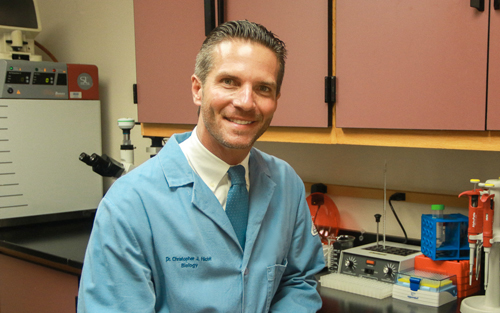While the role of doctors and nurses in the healthcare system is well known, there are many other roles that can provide excellent career options. Many areas of the healthcare system are experiencing a shortage of qualified professionals, creating opportunities for graduates of health science degree programs.
Earn Your Master’s in Health Science Online
Earning an Online Master’s in Health Science degree is a great choice for working students or non-traditional students who need more flexibility in their education. There is no clinical requirement so the entire degree can be completed virtually with no need for on-campus visits or in-person experience.
Why should I earn a Master’s in Health Science?
Earning a Master’s in Health Science can boost both your career prospects and salary. A master’s degree can prepare you for more advanced roles in healthcare such as leadership positions or more technical positions.
PBA’s health science program covers biomedical science, pharmacology, biostatistics, and healthcare policy, with an interdisciplinary approach to faith and science.
Masters in Health Science Job Opportunities
Here are some exciting job opportunities for Master’s in Health Science graduates.
Public Health Administrator
A public health administrator addresses the medical and health needs within a community. They spend time teaching the public about health concerns such as hygiene, staying healthy, and avoiding infections.
Average Salary: $110,680 per year
Job Outlook: 28% growth
Epidemiologist
Epidemiology is a rich and complex field of study. Epidemiologists study the transmission and spread of infectious diseases in order to keep the population safe.
Average Salary: $81,390 per year
Job Outlook: 27% growth
Health Science Librarian
Health science librarians, sometimes known as medical librarians, analyze research and present recent findings on patient care and outcomes, and support the health of the population.
Average Salary: $64,370 per year
Job Outlook: 3% growth
Hospital Administrator
Hospitals are large-scale organizations with complex record-keeping systems. Hospital administrators help design and organize these multi-level processes that keep the healthcare system running smoothly.
Average Salary: $110,680 per year
Job Outlook: 28% growth
Health Informatics Specialist
Informatics is the study of data and technology and its use in improving patient care and outcomes.
Average Salary: $62,990 per year
Job Outlook: 16% growth
Health Policy Analyst
Becoming a health policy analyst is a great option for master’s in health science graduates who want to make a difference in the world. Health policy analysts use their expert knowledge of health and healthcare systems to consult on and review policy proposals that have implications for public health.
Average Salary: $47,466 per year
Job Outlook: 2% decline
Biomedical Illustrator
Do you have an artistic side? A job as a biomedical illustrator will allow health science graduates to combine their knowledge of health with their creative touch. Biomedical illustrators play an important role in health science education and science communication.
Average Salary: $63,615 per year
Job Outlook: 6% growth
Nursing Home Administrator
An aging population creates an increased need for facilities that provide care for the elderly. Nursing home administrators help manage and organize the daily functions of these facilities.
Average Salary: $110,680 per year
Job Outlook: 28% growth
Health Science Writer
Health science communication is an extremely important part of public health. In addition to clinical research and clinical practice, health science needs skilled writers to help educate the population.
Average Salary: $80,050 per year
Job Outlook: 7% growth
Health Educators
Health education is an enriching area of work for individuals who enjoy teaching and are passionate about health science. A health science degree is a great way to start a career teaching health and other related topics.
Average Salary: $62,860 per year
Job Outlook: 7% growth
Healthcare Project Manager
The healthcare industry is currently experiencing a shortage of skilled managers. Healthcare project managers will need to understand technical aspects of the healthcare context they work in as well as fundamental principles of management.
Average Salary: $110,680 per year
Job Outlook: 28% growth
Athletic Trainer
Becoming an athletic trainer can be a rewarding career path for students who are interested in both sport and health. Athletic trainers help prevent and diagnose injuries and support rehabilitation programs.
Average Salary: $57,930
Job Outlook: 14% growth
Biostatistician
A biostatistician uses math and statistics to analyze the factors that impact health. Often, biostatisticians work in clinical research and present their findings at conferences and in academic journals.
Average Salary: $119,702 per year
Job Outlook: 31% growth
Clinical Research Scientist/Coordinator
Clinical research allows science to keep moving forward. Students who enjoy rigorous experimentation may be well-suited to careers as clinical research scientists or research project coordinators.
Average Salary: $100,890 per year
Job Outlook: 10% growth
Care Coordinator
A care coordinator manages a patient’s treatment plan and condition. They support patients as they seek treatment options and help them find hospitals and doctors within their insurance network.
Average Salary: $58,792 per year
Job Outlook: 32% growth
What do you learn in a Master’s in Health Science?
Some of the core courses you will take include:
- Healthcare Policy and Advocacy
- Faith and Science
- Biostatistics and Research Methodology
- Basic Medical Immunology and Microbiology
- Basic Medical Pathology
- Advanced Pathophysiology
- Advanced Pharmacology
- Capstone Course in Health Sciences
Health Science Concentrations
Adding a concentration to your degree is a great way to add a secondary area of expertise and boost your resume. Choose between a concentration in healthcare administration and leadership or biomedical science.
Learn more about PBA’s Online Master’s in Health Science
PBA’s curriculum is centered on preparing for an impactful career and helping you find your purpose. Learn more about the online Master’s in Health Science and start your degree today.
